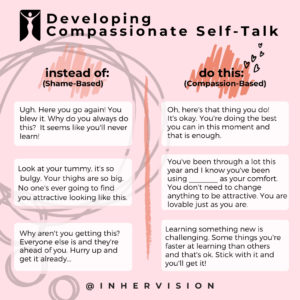The First Step to Emotional Maturity is Self-Compassion
If you were raised by parents who had a habit of being overly critical, who suppressed their emotions or suppressed yours, and who had a habit of blaming you instead of taking responsibility themselves, then chances are you didn’t receive a whole lot of compassion. As a result of this, the relationship that you have with yourself as an adult today is either non-existent or, in the least, troubled.
A part of growing up is getting a chance to look back at some of our stories and see where the adults in our life were in the wrong; to realize that they, too are not perfect. But an even greater part of what we have a chance to do as adults is learn to give ourselves the kind of love we might have missed when we were young. Often, what we missed was the feeling that we are okay, that we are good, no matter how many mistakes me make. This sort of self-loving mindset takes the form of what is known as self-compassion.
What is Self-Compassion?
Self-compassion is the medicine for healing relational pain, that is: wounds derived from being in relationships with others. This is especially important during times when you feel like you’ve failed. This often happens after a break up, or if you’ve slipped back into old habits or addictions that you were trying to kick to the curb. As Dr. Kristin Neff who’s dedicated her work to studying self-compassion, says that it’s about “not ignoring your pain with a ‘stiff upper lip’ mentality”, but you actually pause and tell yourself “this is really difficult right now”. You may ask yourself “how can I comfort and care for myself in this moment?”
Practicing compassion builds self-connection by holding yourself at high regard. You show yourself patience and understanding that you did the best you could with what you had in your toolbox. There’s no criticizing or shaming. Put simply: it’s unconditional love.
Unconditional love sounds easy: loving someone no matter what actions or characteristics they have. But we grow up not being familiar with how to speak it to others and especially not to ourselves.
Ask yourself these questions to see if unconditional love was present is in your childhood:
No matter what I did growing up, did my parent(s) show me love and understanding?
Was I celebrated /acknowledged for who I am and not for my achievements / success?
For many of us, love was conditional. Even though you knew your parents loved you, you got the message growing up that in order to be loved, acknowledged and accepted by them you had to be and act in a certain way. This is when being a “good girl” or “good boy” and a perfectionist came into play. This is when your subconscious mind took on the belief that in order to be loved, acknowledged and accepted by the ones you look up to, you had to be what they wanted you to be. Anytime you were less than perfect or less than what they wanted you to be, you were very hard on yourself. Do you see in this example that there is no room for compassion?
How Can You Cultivate Self-Compassion?
Tweak shame-based, negative self-talk that causes you to plummet in your self-esteem into more understanding and unconditional love. It’s all a matter of hearing the things you’re saying to yourself and revising them. When you continue to revise your self-talk, over time this will become your new way of speaking to yourself. Here are some examples of what that would sound like:

Practicing Self-Compassion
Grieving and allowing yourself to be present to the pain right now is the first step. The very next step that’s equally if not more important is paying attention to how you’re talking to yourself during all this.
Does that voice in your head sound more like beating yourself up for all the “wrongs” you did in the relationship? Criticizing your behavior without the needed compassion to aid in healing? This is important because the more you talk negatively towards yourself, the more disconnected from yourself you become.
If your inner self-talk sounds loving and understanding then you know you’re on the right track.
Compassionate self-talk comprises of 3 things:
- Understanding and empathy of you and your actions in the moment, especially when the outcome is not what you wanted or intended.
- Acceptance that it’s the human condition to be imperfect and to make mistakes, and that’s okay.
Note: It doesn’t mean to be encouraging to “do better tomorrow”, because that only puts pressure on yourself to be and do more and that where you are right now is not enough. Communicate to yourself that where you are and WHO you are is okay, it is enough.
- Kindness towards where you are right now (even if it’s not where you want to be).
